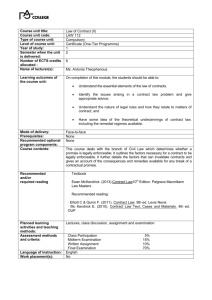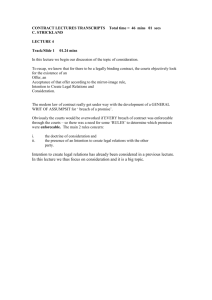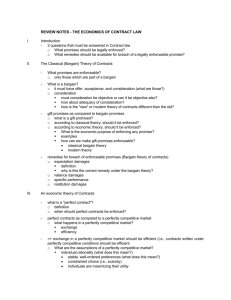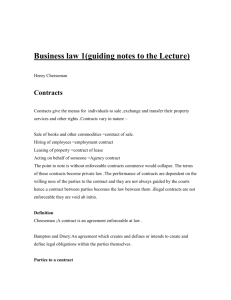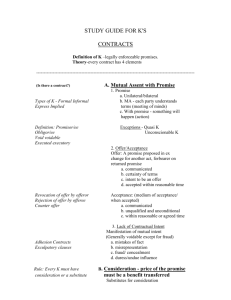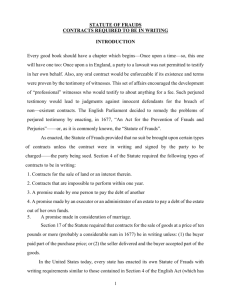Steven Westgate
advertisement
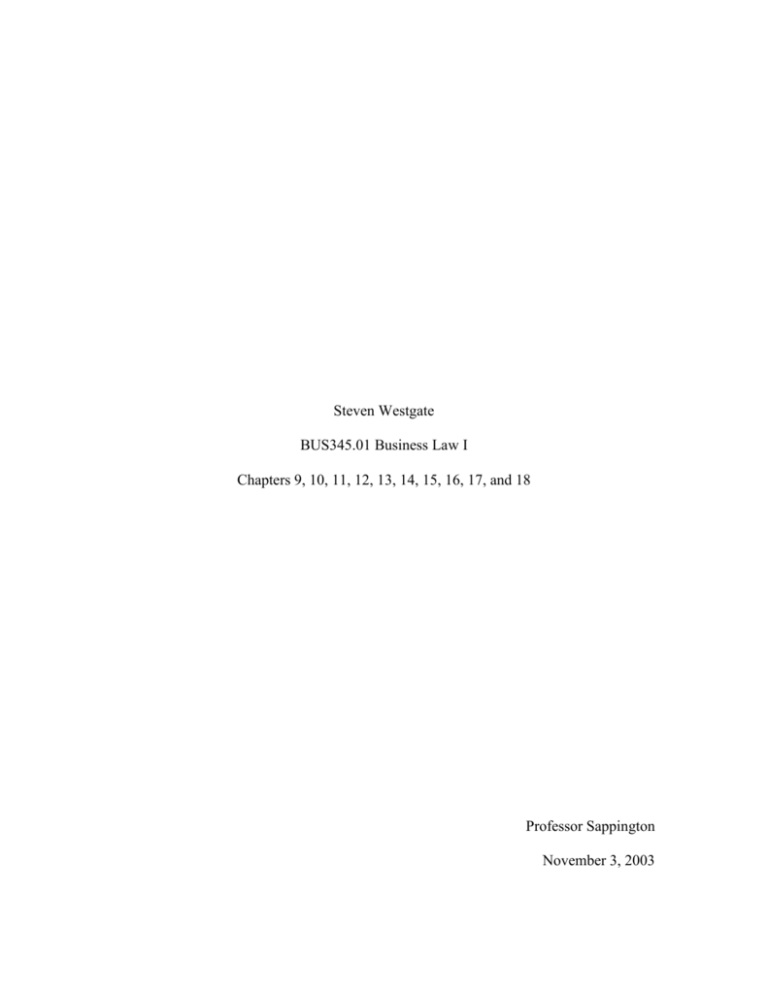
Steven Westgate BUS345.01 Business Law I Chapters 9, 10, 11, 12, 13, 14, 15, 16, 17, and 18 Professor Sappington November 3, 2003 9.1, 9.2, 9.3 9.1) This would indeed be a contract called an implied-in-fact contract. This is a contract that is implied from the conduct of the parties. Unlike other contracts, the contract was created through the conduct of the parties, not through words. This is what Miller and McCleskey have done. The parties both agreed through their conduct that it was alright for Miller to take the candy bar, which he will pay at a later date. 9.2) Nursing Services will probably be able to recover the $4000. Under the objective theory of contracts, intent is not determined by the personal or subjective belief of a party. It is determined by how objective facts would be interpreted by a reasonable person. Therefore, it doesn’t matter that Janine did not feel she should pay for the service because there was no physical contract. From an objective view of a reasonable person, Janine knowingly received services without objecting to them. Since she was aware of this, she should have to pay for the services she has received. 9.3) Atencio and his friend have formed a bilateral contract. In this type of contract, the contract comes into existence at the moment the promises are exchanged. Therefore, at the moment his friend put the red paper in her window, the contract was formed. This contract meant that next week Atencio will give his friend a watch in exchange for $100. Unlike a unilateral contract, a bilateral contract does not have to have a payment of money or delivery of goods to take place. 2 9.4, 10.1, 10.2 9.4) Davison will probably be able to recover payment from Burger Baby. As with unilateral contracts, problems arise when the promissor attempts to revoke the offer after the promisee has begun performance but before the act has been completed. This is exactly what has happened to Davison. He started to swim the Sound only to find out that Burger Baby had revoked their deal. Since Davison had already started, and eventually finished, he should be able to receive payment under the modern view of unilateral contracts. 10.1) No, this is not considered a contract between Ball and Sullivan. Sullivan must then accept the $60,000 offer made by Ball before an agreement or contract can be formed. If Sullivan does not accept the offer of $60,000, a contract has not been formed between the two parties. 10.2) a. The offer Sachs make becomes terminated once he dies. Even if the other party had no notice of the death, the acceptance is terminated when Sach’s dies. b. The offer is automatically terminated once the fire destroys the equipment in this situation. Sachs does not have to tell Barry the equipment has been destroyed for the offer to terminate. c. Barry is allowed to accept the offer because this situation is an irrevocable offer. Even though Sachs has died, an option contract is maintained. This option contract takes away the offeror’s power to revoke the offer for the period of time specified in the option. 3 10.3, 10.4, 11.1 d. This is allowed because, again, this is an irrevocable offer, which means that even death to the offerer, or offeree does not necessarily terminate the offer made. Barry’s estate can then accept the offer to buy the equipment. 10.3) a. In this case, Perez would be billed the $22.95. Since he did not send the books back within 30 days of delivery as the agreement states, ABC will bill him for the specified amount. b. Since Perez never sent the card in, he has no obligation to send ABC the books back, because Perez never accepted the offer of the 30-day trial. 10.4) In this case, Dennis is incorrect. Under the mailbox rule, offer or revocation only becomes valid when the offeree receives it. Since Tanya had not received that revocation by the time she sent the acceptance, it is not applicable and therefore the contract has been formed. 11.1) Martin cannot legally make Tabor pay for cabinets already shipped to Tabor under preexisting duty. However, since both parties mutually agree to rescind their past contract and start a new one, one which charges Tabor $50 per cabinet, Martin can charge the additional fee to Tabor. Therefore, Martin can legally collect the additional $100 on delivery to Tabor of the next installment of ten cabinets. 4 11.2, 11.3, 11.4, 12.1 11.2) According to preexisting duty, the new agreement is not enforceable because it is not supported by legally sufficient consideration. Shade was under a preexisting contract to complete the construction. However, the court can decide to allow rescission, which would enable the two parties to cancel their old contract and make a new contract with the price increase. 11.3) The couple cannot hold Fred in contract for the services rendered to Daniel. Promises made in return for actions or events that have already taken place are unenforceable. If Fred would send the $500, this would be considered a gift, not as part of a contract agreement. The couple gave food and shelter to Daniel without any contract stating something in return. 11.4) Gideon’s claim was based on the law of legal value. Something of legally sufficient value may consist of a promise to do something that one has no prior legal duty to do. In this case, Sagan was going to drive in the race regardless of Gideon’s promise to pay him $3,000. Since Sagan did something that he had no prior legal duty to do, Gideon’s promise would not be considered a basis for a contract. 12.1) Kira is partially correct. The contract is void at the option of the intoxicated person only if the intoxicated person lacks the mental capacity to comprehend the legal consequences of entering into a contract. If this is true in this case, then Kira can get the necklace back from Charlotte if she gives back the $100. 5 12.2, 12.3, 12.4 12.2) Hotel Lux should be successful in its suit against Chef Perlee. It is common for people in certain positions to agree not to work for competitors for a specified period of time after termination of their employment. Hotel Lux and Chef Perlee had a contract, which did not allow Perlee to seek work in competitive restaurants for one year. Since this restriction protects a legitimate business interest, Hotel Lux can probably win the case. 12.3) Depending on what regulations State X has, the contract may be unenforceable. If the purpose is to protect the public from unauthorized practitioners, a contract involving an unlicensed individual normally is illegal and unenforceable. Since obtaining a liquor license is meant to protect the public from unauthorized practitioners, Bekins probably will not have to pay for the drinks because Moffitt wasn’t licensed at that time to serve and mix the drinks. 12.4) Yes, the circumstances were such that the agreement would be unenforceable. The agreement was a contract of adhesion, and whether it was enforceable depended on the reasonable expectations of the adhering party. Thomas’s stressful circumstances under which the agreement was signed, feeling that he had no choice but to immediately sign it may warrant it enough to make the contract unenforceable 6 13.1, 13.2, 13.3 13.1) Juan can probably set aside this contract because this contract was made under undue influence. If the guardian, Samuel, induces an elderly person, Juan, into a contract that benefits the guardian, undue influence may have been exerted. Since this agreement is vastly benefiting Samuel, undue influence has most likely occurred at the expense of Juan. Juan is being taken advantage of and probably does not, in reality, exercise free will in entering into the contract 13.2) Tanner has a fairly good chance of getting his money back from Grano, because fraudulent misrepresentation has most likely occurred. Fraudulent misrepresentation consists of the following elements. First, a misrepresentation of a material fact must occur. In this case, Grano has lied about the income the hotel has made the past year. Secondly, there must be intent to deceive. Grano would have no other reason to lie about the past year’s earnings than to try and persuade Tanner to purchase the hotel. And lastly, the innocent party must justifiably rely on the misrepresentation. Grano had obviously relied on the information Grano had told him when considering purchasing the hotel or not. However, the fact that a bypass to Highway 100 is being planned would have little to do with this case. Also, the prediction Grano makes about the earnings the hotel would earn the following year is a statement of opinion and not fact, and therefore could not be used as a defense. 13.3) a. This contract is unenforceable because it involves a bilateral mistake of fact. Both parties are mistaken as to a material fact. When this occurs, either party can 7 13.4, 14.1 cancel the contract. b. This contract would be enforceable. Although Goldman was threatened by Jacoby to pay him $5,00 or he would take criminal action, it is not duress. Duress only occurs if the threat is wrongful or illegal. In this case, bringing a criminal action is legal; therefore, the contract would be enforceable. 13.4) Steck will probably not be able to rescind this contract. Although Lund lied to Steck about the mileage and condition of the car, Steck went to a mechanic and found that the information Lund gave him was false. Since he did this and was aware of the condition before he purchased the car, his case would not pass the third element of fraudulent misrepresentation, reliance on the misrepresentation. Reliance is not justified if the innocent party knows the true facts, which Steck did. 14.1) a. This contract does not fall under the Statute of Frauds. The one-year rule states that a contract that cannot, by its own terms, be performed within one year from the date it was formed must be in writing to be enforceable. Since Benson accepts the offer and will begin immediately, the contract can be fulfilled within one year and therefore, does not have to be in writing to be enforced. b. This contract falls under the Statute of Frauds. Since Benson will not start working until September 1, it would be impossible to fulfill the contract terms within one year of the formation of the contract (May 5). Therefore, it falls under the Statute of Frauds and must be in writing to be enforceable. 8 14.2, 14.3, 14.4 c. This contract falls under the Statute of Frauds. Since Benson will have two years to submit a written research report, it would be impossible to fulfill the contract terms within one year of the formation of the contract. Therefore, it falls under the Statute of Frauds and must be in writing to be enforceable. 14.2) This promise must be in writing to be enforceable under the Statute of Frauds. This example is a collateral promise. In a collateral promise, a third party promises to assume the debts or obligations of a primary party to a contract if that party does not perform. In this case, Mallory promises to pay the local hardware store for a lawn mower that her brother purchased on credit if her brother, a primary party in the contract, fails to pay the store. 14.3) Damon will probably not be very successful in his defense. In order for a contract to fall under the Statute of Frauds, the agreement must be possible within one ear, even though it may actually take longer to perform. Since there is the possibility of Gary dying within one year, the contract is not enforceable by the one-year rule and therefore, does not have to be in writing to be enforced. 14.4) Jeremy is not correct. The promise is enforceable and need not be in writing under the Main Purpose rule. A promise to answer for the debt of another is covered by the Statute of Frauds unless the guarantor’s main purpose in accepting secondary liability is to secure a personal benefit. This type of contract does not 9 15.1, 15.2, 15.3, 15.4 have to be in writing. In this case, Jeremy secures a personal benefit of waiving his mother’s initial deposit the resort, so he and his mother can stay at the resort. 15.1) Alexander is an intended third party beneficiary of the contract between Michael and Jackson Auto Sales, and has the right to sue the promisor directly for breach of the contract. Alexander is a beneficiary because she directly benefits from the contract of the other two parties. However, in this case Michael is the promisor and therefore Alexander could not sue Jackson Auto Sales. Michael has the right to sue Jackson Auto Sales if they fail to deliver the car to Alexander. 15.2) Thrift would be able to sue Sylvia directly because this is most likely a creditor beneficiary. In this case, the third party beneficiary could bring suit directly against a promisor. A creditor beneficiary is one who benefits from a contract in which one party promises another party to pay a debt that party owes to a third party. The third party, Thrift, becomes the intended beneficiary and can thus enforce the promisor’s promise to pay the debt. 15.3) Since the lease agreement specifies that the lease cannot be assigned without the landlord’s consent. The landlord is correct. Since the landlord objects to the assignment of he last three months to Fred, Marsala cannot assign the remaining balance of the lease to Fred, even though he is financially sound. 15.4) Since Inez has a specific set of plans to build a sailboat, any reputable boat building company would be able to build the boat correctly. This delegation is 10 16.1, 16.2 effective because the performance required is of a routine and nonpersonal nature. However, if Inez contracted with Whale to build and design a sailboat, Whale may have to get the consent of Inez to delegate its duties to Quick Brothers. This is because the performance by the third party may vary materially from that expected by Whale. The design of the boat may vastly vary between the two companies, and therefore Whale would have to obtain the consent of Inez to delegate its duties to Quick Brothers. 16.1) The Caplans’ don’t have much of a claim. As long as Faithful Construction, Inc. provides the important and essential benefits of a contract, the contract is enforceable. As the Court of Appeals of New York said in a similar case, “An omission, both trivial and innocent, will sometimes be atoned for by allowance of the resulting damage, and will not always be the breach of a condition.” Since the plumbing fixtures were of the same quality as the Kohler brand, Faithful Construction would be allowed to use the pipes to finish the construction. 16.2) a. The transaction is a novation. A novation occurs when both of the parties to a contract agree to substitute a third party for one of the original parties. This is the case in this example. All parties accept the new contract between Fred and Iba, where Fred will pay $1,100 to Iba in four installments. This is a new contract that is now between Fred and Iba. b. The contract between Fred and Iba has to be in writing to be enforceable. This 11 16.3, 16.4 contract would be a collateral promise, where a third party assumes the debt of a primary party to a contract if that party does not perform 16.3) Taylor is correct, and he may file a law suite immediately. When on party to a contract informs the other party, prior to the time for performance that he does not intend to perform the contract, this anticipatory repudiation can discharge the nonbreaching party from performance. Taylor has the option of treating the repudiation as a material breach of contract and proceeding immediately to pursue remedies, even though the actual contract delivery date is still a month away. 16.4) A. Since Jimenez has died, his contract to perform is discharged, because his performance was essential to the completion of the contract. b. Raglione’s contract would still be valid because her personal performance was not essential to the completion of the contract. Her death would not discharge the contract. c. If a specific subject matter of the contract is destroyed, the contract may be discharged. In this case, the apples have been destroyed by the frost; therefore, her performance is rendered impossible owing to the frost. d. This contract may be discharged with regards to frustration of purpose. A contract will be discharged is supervening circumstances make it impossible to attain the purpose both parties had in mind when making the contract. 12 16.5, 17.1, 17.2 16.5) Murphy does not have to pay Lone Star for breach of contract, because Lone Star did not fulfill their end of the requirements. According to the contract, they were to have the wine delivered on or before June 1. However, the truck did not arrive until June 2. Therefore, the contract has been breached and Murphy is not obligate to perform his end of the contract. 17.1) Cohen is correct. Liquidated damages are damages that are certain in amount and specify a certain amount to be paid in the event of a future breach of contract. Since the down payment seems reasonable, Cohen should be able to keep the down payment as liquidated damages. 17.2) a. Specific performance would be an appropriate remedy for this situation. Since this contract involves a land sales contract, the buyer is granted specific performance. The legal remedy for breach of a land sales contract is inadequate because every parcel of land is considered to be unique. b. This would not be a situation where specific performance would be used. Singing and dancing is not a special situation where some unique good is involved. Since monetary damages would probably be an adequate remedy, specific performance would not be used. c. Specific performance would be an appropriate remedy for this situation. Since the contract involves a very unique good, the buyer is granted specific performance. A buyer would not be able to obtain substantially identical substitutes in the market, so specific performance would be granted. 13 17.3, 17.4, 18.1 d. This would not be a situation where specific performance would be used. Stocks are worth a certain amount of money; therefore, specific performance is not needed to remedy the breach. 17.3) Sweet will probably have to pay for the compensatory damages as well as any consequential damages (foreseeable damages that result from a party’s breach of contract). Although it would be up to a court to decide what the consequential damages would be, it would most likely include the higher price Ken had to pay from another company and the lost profits from this year’s lost Christmas sales. Since Sweet knew of the special circumstances surrounding the Christmas season, they would be liable for consequential damages. However, Sweet would not be liable for any punitive damages. Punitive damages are normally only available when a tort is also involved, which in this case is not. 17.4) Wallechinsky is correct that Anderson cannot hold her in breach. Since Anderson had accepted the first six payments even though they were late, a pattern of conduct is established which means any successive breach that is similar is acceptable. If Anderson wishes to start receiving payment as the contract originally specified, he should notify Wallechinsky of this. 18.1) Paul has not entered into a contract, because he has not willingly entered into the contract. An online offer should include some mechanism by which the customer may accept the offer. Since Companies Unlimited has not provided such a feature, the contract will not be enforceable. 14 18.2, 18.3, 18.4, 18.5 18.2) Anne has entered into an enforceable contract to pay for E-Commerce Weekly. The company made available the terms of the contract to Anne. This is an example of a browse-wrap agreement. Browse-wrap terms may not be enforced on the ground that the user is not made aware that she is entering into a contract. In this case, Anne has been made aware of entering into a contract, so she has entered into an enforceable contract. 18.3) The contract is enforceable because the terms were made readily available on the screen and therefore, did not have to be accepted before obtaining the subscription. Subsequently, Marketing World probably can’t make Bob pay the interest. Marketing World should consider including the agreement on the same page. 18.4) The appellate court held that the forum-selection clause was a valid party of the contract. The parties to a contract may include a provision that establishes a venue in particular. Since the clause regarding venue was phrased in mandatory terms, there’s no reason to not enforce it. Since Perry agreed to the terms of the license agreement by breaking the seal on the software, any disputes concerning the contract should be settled in the Court of Shelby County, Tennessee. 18.5) I think the court should dismiss the case, based on these facts. Ticketmaster’s interior web page contains the Ticketmaster logo at the top of the site, so the 15 customer should know that he is dealing with Ticketmaster.com and not Tickets.Com. Also, if Tickets.Com tells the customer that this is a link to a third party’s site, there shouldn’t be any confusion as to whose site the customer is currently browsing. Since the agreement was not directly on the home page itself, bypassing the home page should not warrant any cause for legal action. 16
